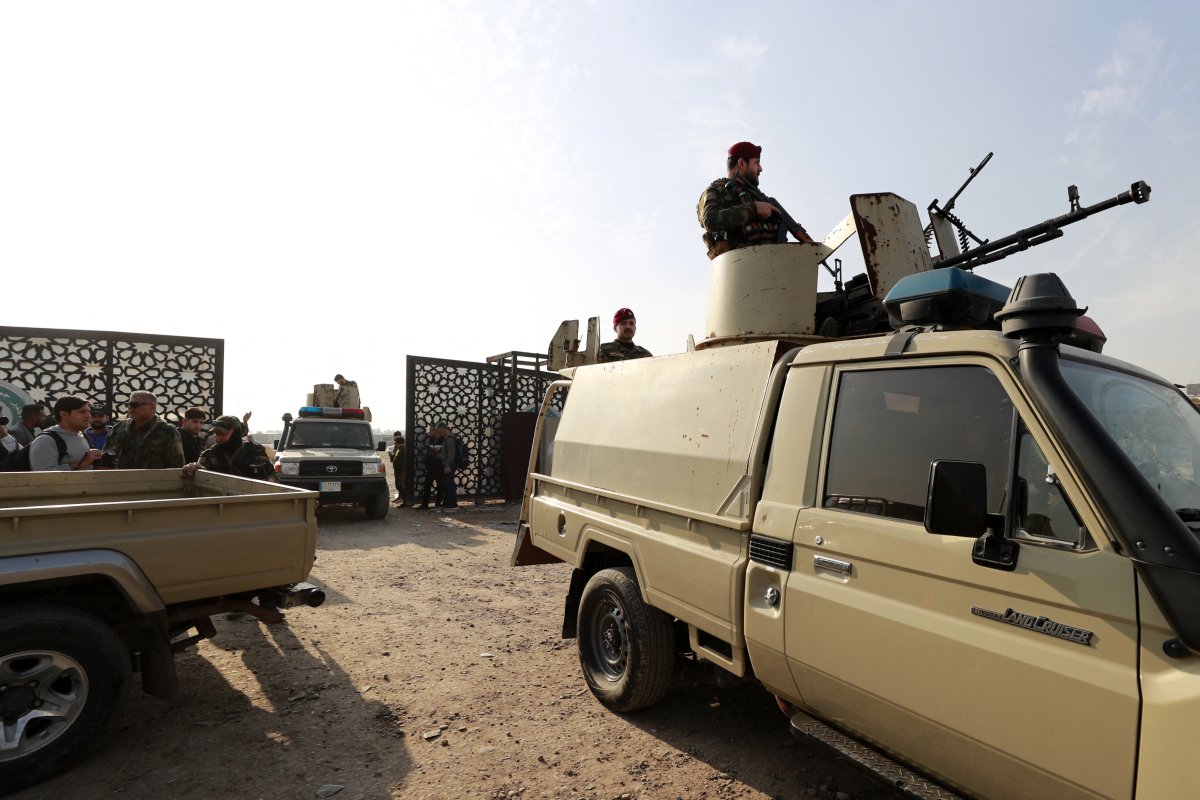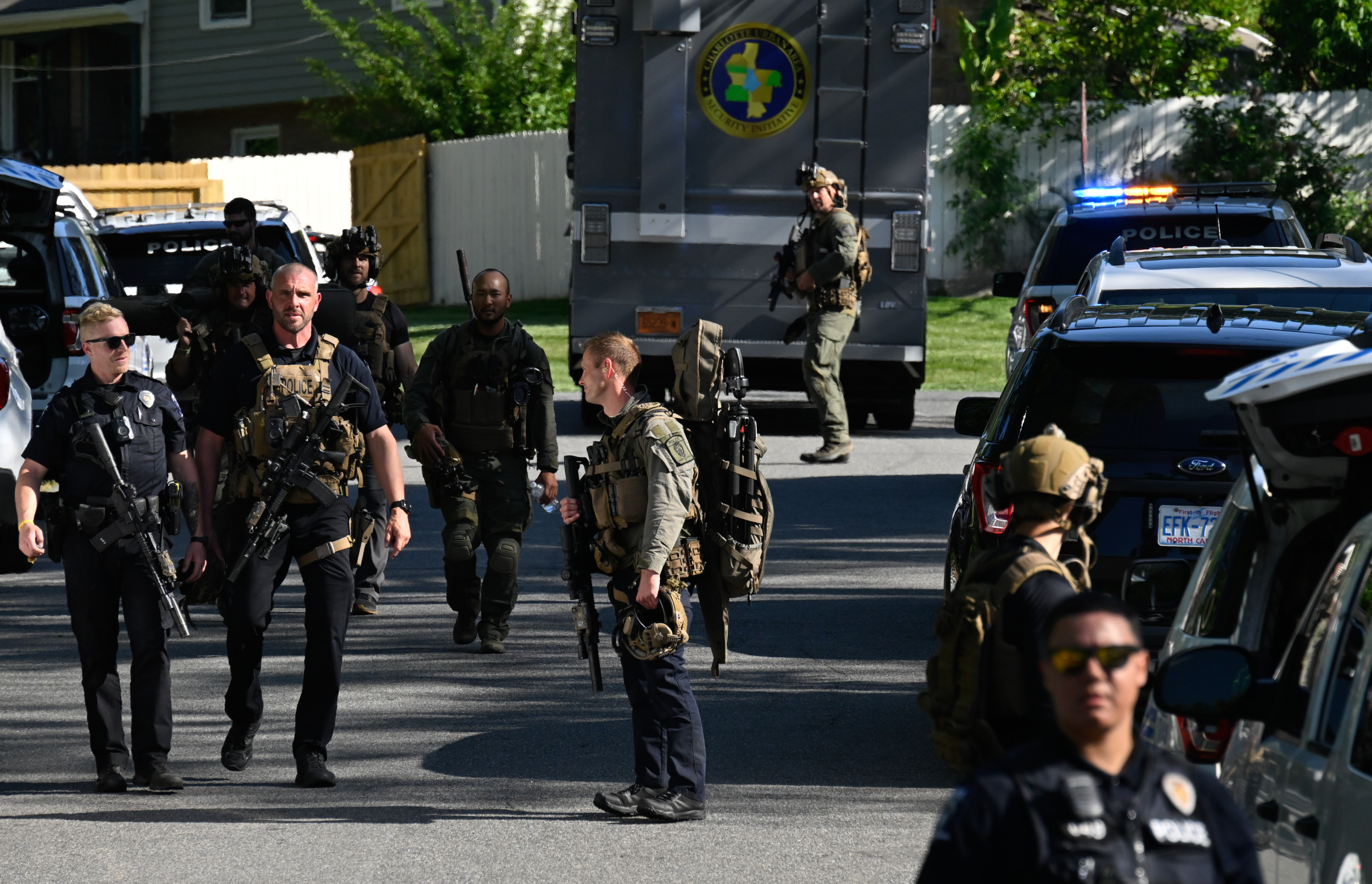An Iraqi militia targeted in a recent attack in Baghdad is blaming the United States and has told Newsweek that Washington should expect a severe response as regional tensions over the war in Gaza continue to spill over.
"We know who carried out this terrorist act—they are the American forces—and the response will be very harsh and earth-shattering," a spokesperson for the Nujaba Movement told Newsweek.
It is one of several armed factions in Iraq that have ties to Iran and have participated in a months-long campaign of rocket and drone strikes under the banner of the "Islamic Resistance in Iraq" against U.S. forces in response to U.S. support for Israel's offensive against Hamas and allied Palestinian factions in Gaza.
The movement, whose political chief vowed to only escalate attacks against U.S. troops in response to airstrikes during an interview with Newsweek last month, is also part of the Popular Mobilization Forces, an Iraqi state-sponsored umbrella of paramilitary groups organized to battle the Islamic State militant group (ISIS) nearly a decade ago.
A Popular Mobilization Forces headquarters was reportedly targeted Thursday in an unclaimed drone strike resulting in the deaths of at least four people, including Nujaba Movement commander Abu Taqwa al-Saidi, garnering condemnation from Iraq's political and security sectors.
A Pentagon spokesperson did not immediately confirm or deny to Newsweek the U.S.' involvement in the attack but asserted that "the United States is continuing to take action to protect our forces in Iraq and Syria by addressing the threats they face."

Newsweek reached out to the Iraqi government's press office and U.S. Central Command for comment.
In a statement shared by the office of Iraqi Prime Minister Mohammed Shia al-Sudani, Iraqi Armed Forces commander-in-chief spokesperson Major General Yahya Rasool decried the strike as "a blatant aggression and violation of Iraq's sovereignty and security" that was "akin to terrorist activities."
"This act resulted in casualties and is unequivocally condemned," Rasool said. "The Iraqi Armed Forces hold the Global Coalition Forces responsible for this unwarranted attack on an Iraqi security entity that is operating within the powers authorized by the Commander-in-Chief of the Armed Forces."
"This action undermines the previously established understandings between the Iraqi Armed Forces and the Global Coalition Forces," Rasool added.
Washington and Baghdad forged their security partnership in the wake of the U.S.-led 2003 invasion that toppled Iraqi President Saddam Hussein. Since then, Iraq has also developed closer ties with neighboring Iran and tensions between Washington and Tehran have often played out across Iraq.
Rasool further accused the U.S. on Thursday of conducting "a dangerous escalation and assault on Iraq, diverging from the spirit and the text of the mandate and the mission for which the Global Coalition was established in Iraq," a mandate focused solely on battling ISIS and training and advising Iraqi forces.
A representative of the Popular Mobilization Forces told Newsweek that "the competent authorities are now conducting an investigation into the incident" and that "our position as the Popular Mobilization Forces is the official government position."
Echoing the military, the Iraqi Foreign Ministry also expressed its "strong condemnation of the blatant attack that targeted one of the Iraqi security headquarters on Thursday" and stressed that "the attack on a security formation linked to the Commander-in-Chief of the armed forces and is subject to the authority of the State is a dangerous escalation."
"We affirm that Iraq reserves its right to take a firm position and all measures that deter those who try to harm its land and security forces," the Iraqi Foreign Ministry stated.
Newsweek has previously reported on Iraqi government concerns of the war in Gaza spreading to Baghdad and Sudani's efforts to condemn unsanctioned militia activity as well as U.S. operations conducted without his administration's permission.
A day before the latest strikes in Baghdad, the Islamic Resistance in Iraq, a coalition of Iran-aligned militias, claimed two drone attacks Wednesday on U.S. forces in eastern and southeastern Syria "in continuation of our approach to resisting the American occupation forces in Iraq and the region, and in response to the Zionist entity's massacres against our people in Gaza."
Iran, for its part, has hailed such self-styled "Axis of Resistance" initiatives, including the initial Hamas-led October 7 surprise attack that sparked the deadliest-ever war in Gaza, but has denied any command or control over militias across the region.
The latest unrest in Iraq came in the wake of other potentially destabilizing events, including the assassination of a leading Hamas official in Lebanon and twin bombings in Iran that marked the nation's deadliest attack since the establishment of the Islamic Republic in 1979. The attack in Iran targeted a procession mourning the fourth anniversary of the U.S. killing of Iran's Islamic Revolutionary Guard Corps Quds Force commander Major General Qassem Soleimani at Baghdad International Airport.
No country or group has claimed responsibility for the attacks in Lebanon or Iran, though Israel has been widely blamed for both acts of violence.
Meanwhile, President Joe Biden's administration has repeateadly argued that it did not want the war in Gaza to spread. This is despite a growing number of confrontations involving unfolding on various fronts, such as in Iraq and Syria, as well as off the coast of Yemen, where the U.S. has formed a maritime coalition to prevent attacks launched by another Iran-aligned group, Ansar Allah, or the Houthi movement, on commercial ships with alleged links to Israel.
During a heated exchange with a reporter on a White House press call Wednesday, National Security Council Strategic Communications Coordinator John Kirby insisted that the 13-nation Operation Prosperity Guardian was a "defensive coalition."
While the Pentagon has yet to claim the latest attack in Baghdad, previous U.S. strikes against the Nujaba Movement and other Iran-linked militias in Iraq have also been described as defensive and retaliatory in nature.
Also speaking to reporters on Wednesday, a senior Biden administration official asserted that the U.S. would continue to take action in these theaters without looking to become mired into a broader conflict.
"If you look at the action we've taken, we will act very forcefully when it comes to any threats against our people or our interests," the senior administration official said at the time. "We're also going to do so in a very smart way that does not potentially draw us in deep to a situation that actually plays into the hands of some of these proxy groups."
Uncommon Knowledge
Newsweek is committed to challenging conventional wisdom and finding connections in the search for common ground.
Newsweek is committed to challenging conventional wisdom and finding connections in the search for common ground.
About the writer
Based in his hometown of Staten Island, New York City, Tom O'Connor is an award-winning Senior Writer of Foreign Policy ... Read more
To read how Newsweek uses AI as a newsroom tool, Click here.








